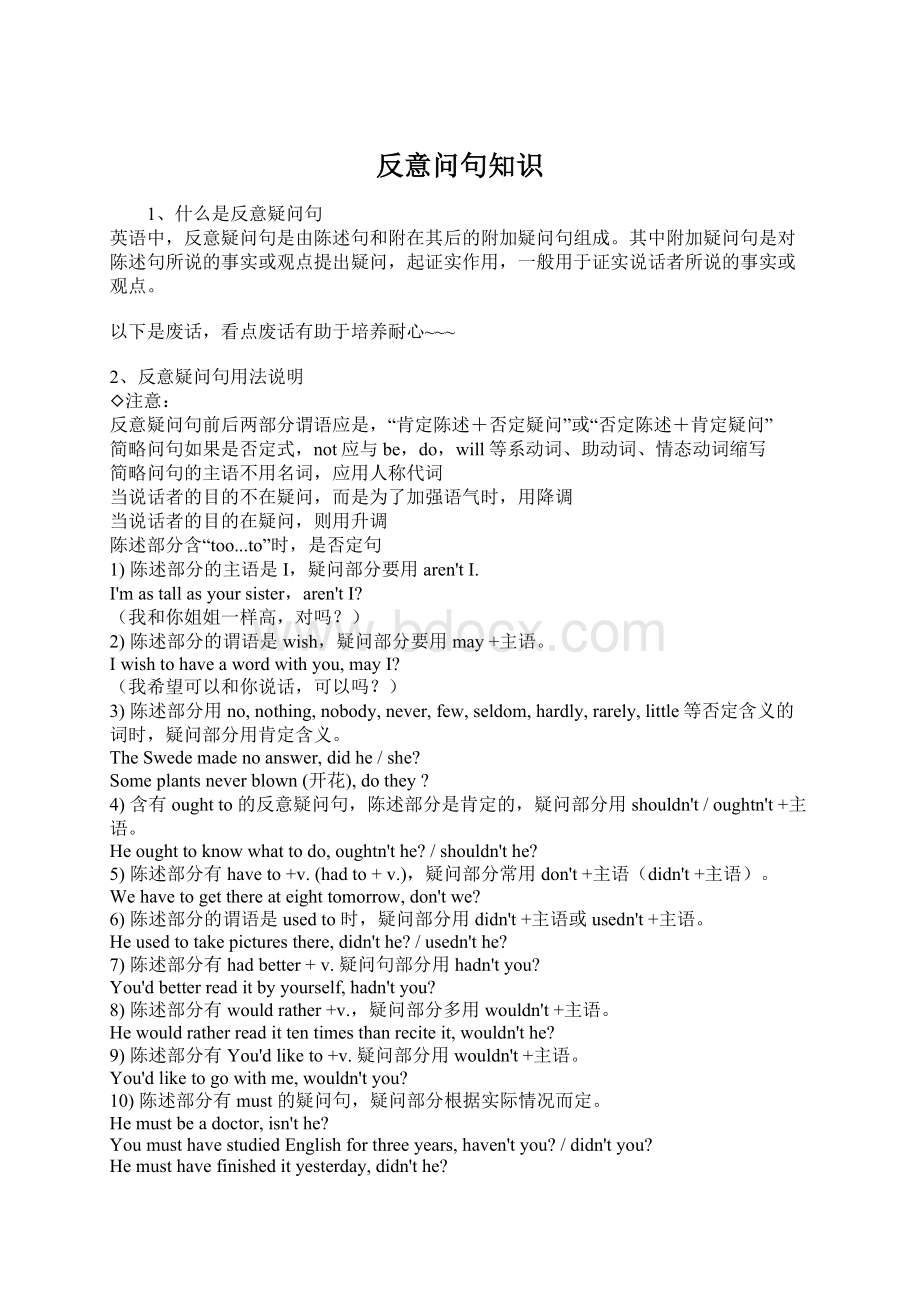反意问句知识.docx
《反意问句知识.docx》由会员分享,可在线阅读,更多相关《反意问句知识.docx(12页珍藏版)》请在冰豆网上搜索。

反意问句知识
1、什么是反意疑问句
英语中,反意疑问句是由陈述句和附在其后的附加疑问句组成。
其中附加疑问句是对陈述句所说的事实或观点提出疑问,起证实作用,一般用于证实说话者所说的事实或观点。
以下是废话,看点废话有助于培养耐心~~~
2、反意疑问句用法说明
◇注意:
反意疑问句前后两部分谓语应是,“肯定陈述+否定疑问”或“否定陈述+肯定疑问”
简略问句如果是否定式,not应与be,do,will等系动词、助动词、情态动词缩写
简略问句的主语不用名词,应用人称代词
当说话者的目的不在疑问,而是为了加强语气时,用降调
当说话者的目的在疑问,则用升调
陈述部分含“too...to”时,是否定句
1)陈述部分的主语是I,疑问部分要用aren'tI.
I'mastallasyoursister,aren'tI?
(我和你姐姐一样高,对吗?
)
2)陈述部分的谓语是wish,疑问部分要用may+主语。
Iwishtohaveawordwithyou,mayI?
(我希望可以和你说话,可以吗?
)
3)陈述部分用no,nothing,nobody,never,few,seldom,hardly,rarely,little等否定含义的词时,疑问部分用肯定含义。
TheSwedemadenoanswer,didhe/she?
Someplantsneverblown(开花),dothey?
4)含有oughtto的反意疑问句,陈述部分是肯定的,疑问部分用shouldn't/oughtn't+主语。
Heoughttoknowwhattodo,oughtn'the?
/shouldn'the?
5)陈述部分有haveto+v.(hadto+v.),疑问部分常用don't+主语(didn't+主语)。
Wehavetogetthereateighttomorrow,don'twe?
6)陈述部分的谓语是usedto时,疑问部分用didn't+主语或usedn't+主语。
Heusedtotakepicturesthere,didn'the?
/usedn'the?
7)陈述部分有hadbetter+v.疑问句部分用hadn'tyou?
You'dbetterreaditbyyourself,hadn'tyou?
8)陈述部分有wouldrather+v.,疑问部分多用wouldn't+主语。
Hewouldratherreadittentimesthanreciteit,wouldn'the?
9)陈述部分有You'dliketo+v.疑问部分用wouldn't+主语。
You'dliketogowithme,wouldn'tyou?
10)陈述部分有must的疑问句,疑问部分根据实际情况而定。
Hemustbeadoctor,isn'the?
YoumusthavestudiedEnglishforthreeyears,haven'tyou?
/didn'tyou?
Hemusthavefinishedityesterday,didn'the?
11)感叹句中,疑问部分用be+主语。
Whatcolours,aren'tthey?
Whatasmell,isn'tit?
12)陈述部分由neither…nor,either…or连接的并列主语时,疑问部分根据其实际逻辑意义而定。
NeitheryounorIamengineer,arewe?
13)陈述部分主语是指示代词或不定代词everything,that,nothing,this,疑问部分主语用it。
Everythingisready,isn'tit?
14)陈述部分为主语从句或并列复合句
a.并列复合句疑问部分,谓语动词根据邻近从句的谓语而定。
Mr.SmithhadbeentoBeijingforseveraltimes,heshouldhavebeeninChinanow,shouldn'the?
b.带有定语从句,宾语从句的主从复合句,疑问部分谓语根据主句的谓语而定:
Heisnotthemanwhogaveusatalk,ishe?
HesaidhewantedtovisitJapan,didn'the?
c.上述部分主句谓语是think,believe,expect,suppose,imagine等引导的宾语从句,疑问部分与宾语从句相对应构成反意疑问句。
Idon'tthinkheisbright,ishe?
Webelieveshecandoitbetter,can'tshe?
但此时主语必须是第一人称
如果不是则不能否定从句
如Hethoughttheywerewrong,didn'the?
而不能说weren'tthey?
15)陈述部分主语是不定代词everybody,anyone,somebody,nobody,noone等,疑问部分常用复数they,有时也用单数he.
Everyoneknowstheanswer,don'tthey?
(doeshe?
)
Nobodyknowsaboutit,dothey?
(doeshe?
)
16)带情态动词dare或need的反意疑问句,疑问部分常用need(dare)+主语。
Weneednotdoitagain,needwe?
Hedarenotsayso,dareyou?
当dare,need为实义动词时,疑问部分用助动词do+主语。
Shedoesn'tdaretogohomealone,doesshe?
17)省去主语的祈使句的反意疑问句,疑问部分用willyou。
Don'tdothatagain,willyou?
Gowithme,willyou/won'tyou?
注意:
Let's开头的祈使句,后用shallwe(或用shan'twe)?
Letus开头的祈使句,后用willyou(或won'tyou)?
Let'sgoandlistentothemusic,shallwe(或用shan'twe)?
Letuswaitforyouinthereading-room,willyou(或won'tyou)?
18)陈述部分是"therebe"结构的,疑问部分用there省略主语代词。
Thereissomethingwrongwithyourwatch,isn'tthere?
Therewillnotbeanytrouble,willthere?
19)否定前缀不能视为否定词,其反意疑问句仍用否定形式。
Itisimpossible,isn'tit?
Heisnotunkindtohisclassmates,ishe?
20)must在表"推测"时,根据其推测的情况来确定反意疑问句。
Hemustbetherenow,isn'the?
Itmustbegoingtoraintomorrow,won'tit?
21)当主句是由so引起的一个句子,而且译为“这么说来”时,疑问部分的谓语形式(肯定或否定)应与主句保持一致。
Soyouhaveseenthefilm,haveyou?
SohehasnotbeentoBeijing,hasn'the?
『补:
Let's和Letus的区别』
◇1.Let's是Letus的缩写。
包括说话人和听话人双方在内,含有催促、建议或请对方一起行动的意思。
在听话人表示赞同建议时可只用Let's.如:
---Shallwegobytrain?
---Yes,let's.
◇2.当请求对方允许自己(第一人称复数)做某事时,要用Letus,这里的us不包括听话对方在内,不能缩写为Let's.
如两个同学对老师说:
Pleaseletusremovethebookshelfforyou.
让我俩给你移动一下书架。
◇3.两者在构成附加疑问句时,方法不同。
如:
Let'sgotoseethefilm,shallwe?
咱们去看电影,好吗?
Letusgotoseethefilm,willyou?
让我们去看电影,好吗?
『当陈述句部分有情态动词must时,反意疑问部分有四种情况』
(1)must表示“必须、禁止“时,反意疑问部分要用must(mustn’t)。
例Youmustn’tstopyourcarhere,mustyou?
你不能把车停在这地方,知道吗?
(2)must表示“有必要”时,反意疑问句部分要用needn’t。
例Theymustfinishtheworktoday,needn’tthey?
他们今天必须要完成这项工作,是吗?
(3)当must用来表示对现在的情况进行“推测”时,反意疑问部分要根据must后面的动词采用相应的形式。
例Hemustbegoodatmaths,isn’the?
他数学一定学得很好,是吗?
(4)当must用来表示对过去的情况进行“推测”(must+havedone)时,如强调对过去情况的推测(一般句中有过去的时间状语),反意疑问句部分要用“didn’t+主语”;如果强调动作的完成(一般没有过去时间状语),反意疑问句部分要用“haven’t/hasn’t+主语”。
例Shemusthavereadthenovellastweek,didn’tshe?
她上星期一定读了这本小说了,是吗?
Youmusthavetoldheraboutit,haven’tyou?
你一定把这事告诉她了,是吗
快速记忆表
陈述部分的谓语疑问部分
Iaren'tI
Wishmay+主语
no,nothing,nobody,never,
few,seldom,hardly,肯定含义
rarely,little等否定
含义的词
oughtto(肯定的)shouldn't/oughtn't+主语
haveto+v.(hadto+v.)don't+主语(didn't+主语)
usedtodidn't+主语或usedn't+主语
hadbetter+v.hadn'tyou
wouldrather+v.wouldn't+主语
you'dliketo+v.wouldn't+主语
must根据实际情况而定
感叹句中be+主语
Neithe